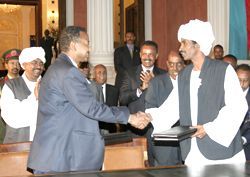Eastern Sudan hopes to reap peace dividends
Oct 26, 2006 (KASSALA) — The peace deal signed by Khartoum and eastern rebels earlier this month has lifted spirits in Kassala, a city in the impoverished east of Sudan which hopes to see trade prosper again after years of fighting.
 “A wind of optimism is blowing on the city. We are hoping that the border with Eritrea will reopen so that we can start exporting our products again,” says Ali Abdel Hadi, a 65-year-old date merchant.
“A wind of optimism is blowing on the city. We are hoping that the border with Eritrea will reopen so that we can start exporting our products again,” says Ali Abdel Hadi, a 65-year-old date merchant.
Kassala, its low-lying thatched and stone buildings cozying up to a barren ochre mountain, sits only a few miles from the Eritrean border and some 650 kilometers (400 miles) east of the capital Khartoum.
The city of more than 150,000 inhabitants has always been a regional trading hub.
Its streets are still filled with farming produce and workshops manufacturing leather goods as well as the trademark swords worn by local Beja tribesmen.
“Yes, we really hope the border will re-open,” says Taieb Makbul Yusef, a 21-year-old farmer.
In the Kassala area, the African Beja tribe have co-existed peacefully with the Rashidiya, a tribe originally from the Arabian peninsula.
The alliance between the two ethnic groups was sealed through the Khatmiyyah brotherhood, a Sufi movement that wields great influence in Kassala and its surroundings.
The two groups also fought side by side in their decade-conflict against what they claimed was marginalization by the central government in Khartoum.
The civil war ended with a peace deal signed October 14 in Asmara – which Khartoum had accused of supporting the rebels – thanks partly to a mediation by the leader of the Khatmiyyah, Osman Al Mirghani.
Two days after the landmark deal was signed, President Omar Hassan Al Bashir lifted the state of emergency that had been choking Sudan’s three eastern states of Kassala, Red Sea, and Gedaref.
The Eastern Front – a coalition of eastern rebel movements created in 2005 – received guarantees that eastern states would be given greater priority in the government’s development policies.
In addition to more investments in their region, eastern leaders have also obtained that an aide to the president and a state minister be chosen from their ranks, as well as eight members of parliament.
The peace deal also provides for all Eastern Front members detained by the government to be released and former rebels to be incorporated into the regular army.
The agreement signed in Asmara was the third Sudanese peace deal in two years, after the moribund Darfur deal reached in May and the January 2005 north-south agreement that started to come apart at the seams.
Some Kassala residents fear that the Asmara accord is just as fragile and see little prospect of rapid change, arguing that there are too few guarantees of implementation.
“The only reason the market is bustling like this today is because of Eid Al Fitr,” says one farmer, referring to the feast marking the end of the Muslim fasting month of Ramadan.
He traveled several miles on dirt roads to Kassala to sell tomatoes and says that the poverty in eastern Sudan is such that it would take years and billions of dollars to lift the region out of its plight.
(AFP)
